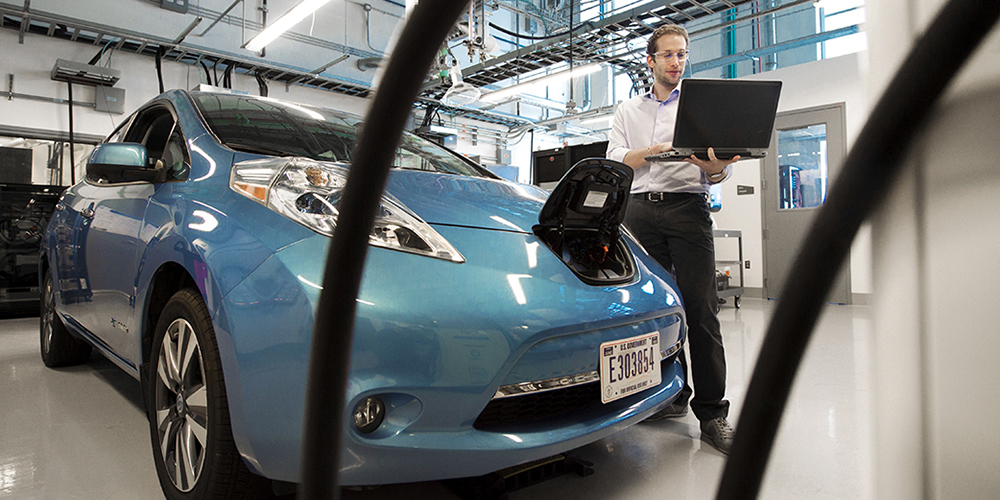As demand for renewable energy increases worldwide, energy companies are taking aggressive steps to meet it.
One of the most ambitious and earliest movers in this trend is Shell, which in 2018 launched an award-winning clean technology accelerator with the U.S. Department of Energy’s (DOE’s) National Renewable Energy Lab (NREL).
A Powerful Partnership
The Shell Gamechanger Accelerator Powered by NREL (GCxN) is a partnership between global energy company Shell and DOE’s National Renewable Energy Laboratory.
Leveraging the innovative spirit of the world’s startup community along with Shell and NREL’s resources, expertise, and facilities, the Shell GameChanger Accelerator Powered by NREL (GCxN) identifies and helps advance emerging transformative energy technologies with the potential to significantly impact the future energy landscape. Through the program, NREL works with Shell to identify, vet, and advance participating companies and technologies, with NREL taking the technical support lead and Shell providing non-dilutive seed funding and access to its technical experts.
Working with clean tech startups is a core pillar of Shell’s energy transition strategy. And, according to Shell’s GCxN Program Director Haibin Xu, NREL is one of the most important partners in this effort.
“With its top scientists and world class facilities, NREL is a great match for Shell GameChanger in supporting passionate tech entrepreneurs,” Xu said. “Through our collaboration with NREL’s Innovation & Entrepreneurship Center, we can leverage its strong network of national and international channel partners with our industry expertise and really help start-ups expedite the testing and validation of their potentially game-changing technologies.”
The First Cohort
Building off the success of the original Shell GameChanger founded in 1996 and NREL’s Innovation Incubator (IN2) that debuted in 2014, GCxN launched last September before introducing its first cohort just three months later. Selected were three companies focused on long-term energy storage and grid integration solutions. Each were eligible to receive up to $250,000 in technical support funding that the companies could use to test, perfect, and further develop their technologies as they mature towards market readiness.
The first cohort of companies:
Electric Grid Monitoring (EGM): EGM’s Meta-Alert system measures multiple grid parameters – voltage, current, frequency, cable temperature, ambient temperature, tilt or sag of line cables and others, to optimize grid management and operations.
Feasible: Feasible makes EchoStat, a hardware-software system that measures performance and predicts degradation of electric-vehicle batteries using a unique combination of ultrasound and data analytics.
Antora Energy: Antora Energy is building a low-cost thermal battery for grid-scale energy storage designed to meet the long-duration storage needs being created by the global transition to renewables.
Work has begun at NREL’s campus in Golden, Colorado, with all three startups. Company founders and NREL principal investigators are combining their expertise and lab capabilities to effect the market.
“NREL has some of the leading technologies and capabilities in terms of testing not just small research sized batteries, but actual large commercially relevant batteries and groups of batteries together,” said Andrew Hsieh, co-founder and CEO of Feasible.
“To be able to work with NREL and leverage their capabilities–that we would otherwise have no hope of acquiring at these early stages–that gives us the validation that we would only be able to do 2-3 years down the line. We’re able to do it right now.”
Antora Energy CTO Justin Briggs, on the other hand, appreciates the commitment shown by Shell.
“One of the most exciting things is the signal this gives to the transition towards clean energy. When the big incumbent energy players like Shell start to put multi-million dollars toward developing new disruptive clean technologies, the writing is on the wall: clean technology is the future.”
In addition, the reputations of both Shell and NREL benefit the business case. “The response from potential customers becomes unbelievable–the recognition of joining such a program (as GCxN) provides significant value added,” said Amir Cohen, founder and CEO of EGM.
Next Up: Fast Charging and Grid Integration
GCxN is now reviewing applications for its next class, this time focusing on electric vehicle fast-charging solutions as well as grid integration. The second GCxN cohort will launch this winter after completing a global search for participants, with the competition for GCxN’s third cohort beginning shortly thereafter.
“We’re always looking for novel, transformative energy technologies,” says NREL GCxN co-director, Adam Duran. “And for technologies that we at NREL and Shell are well positioned to advance.”
Pairing private-sector leaders like Shell with publicly funded research organizations like NREL provides startups with a flexible pathway towards growth and development of their technology while addressing shared energy challenges.
Clearly, creating and delivering renewable energy and energy efficient solutions is good business. And businesses like Shell are responding.
“We see right now a very clear opportunity to reshape the energy market,” said Xu. “We have to work together to bring these disruptive technologies to life.”
Learn more about GCxN.






